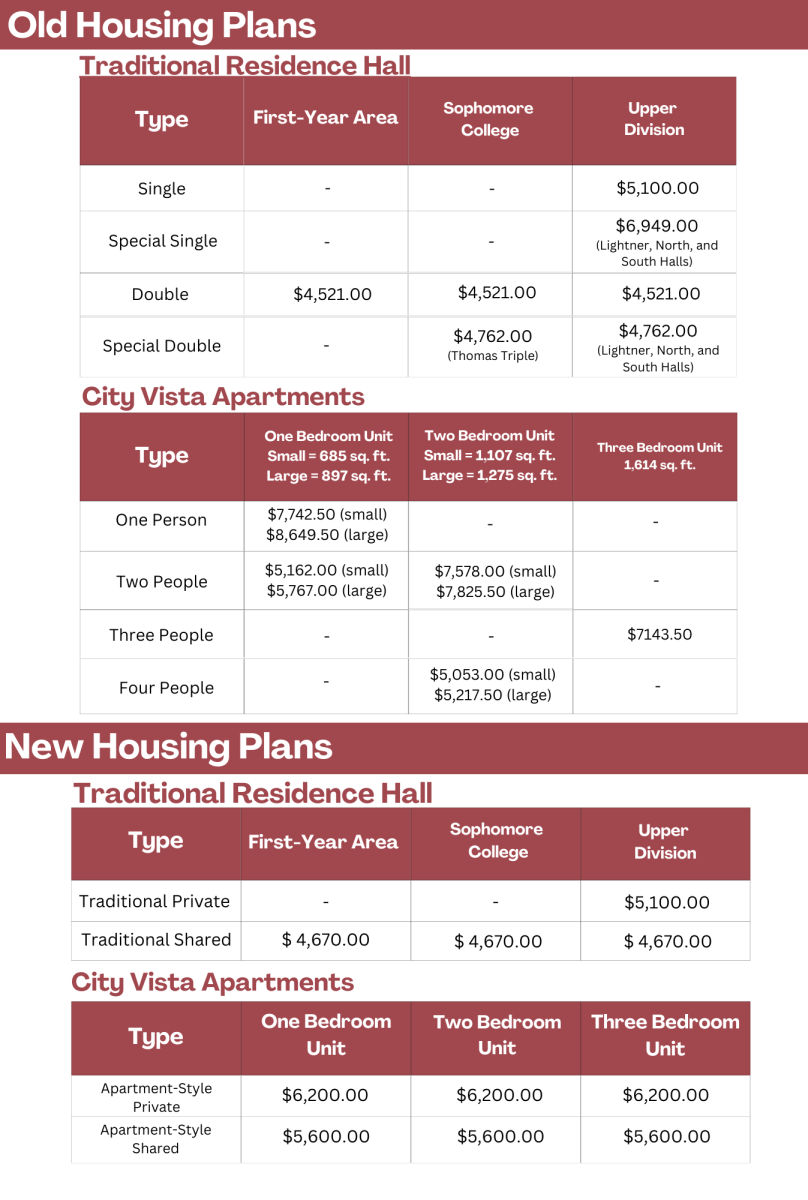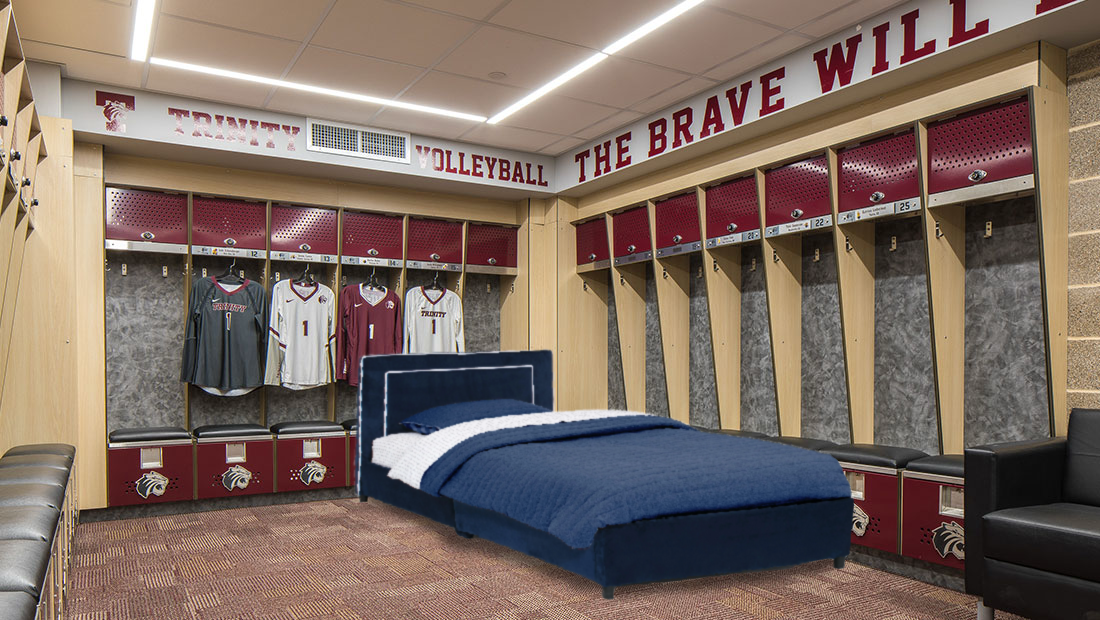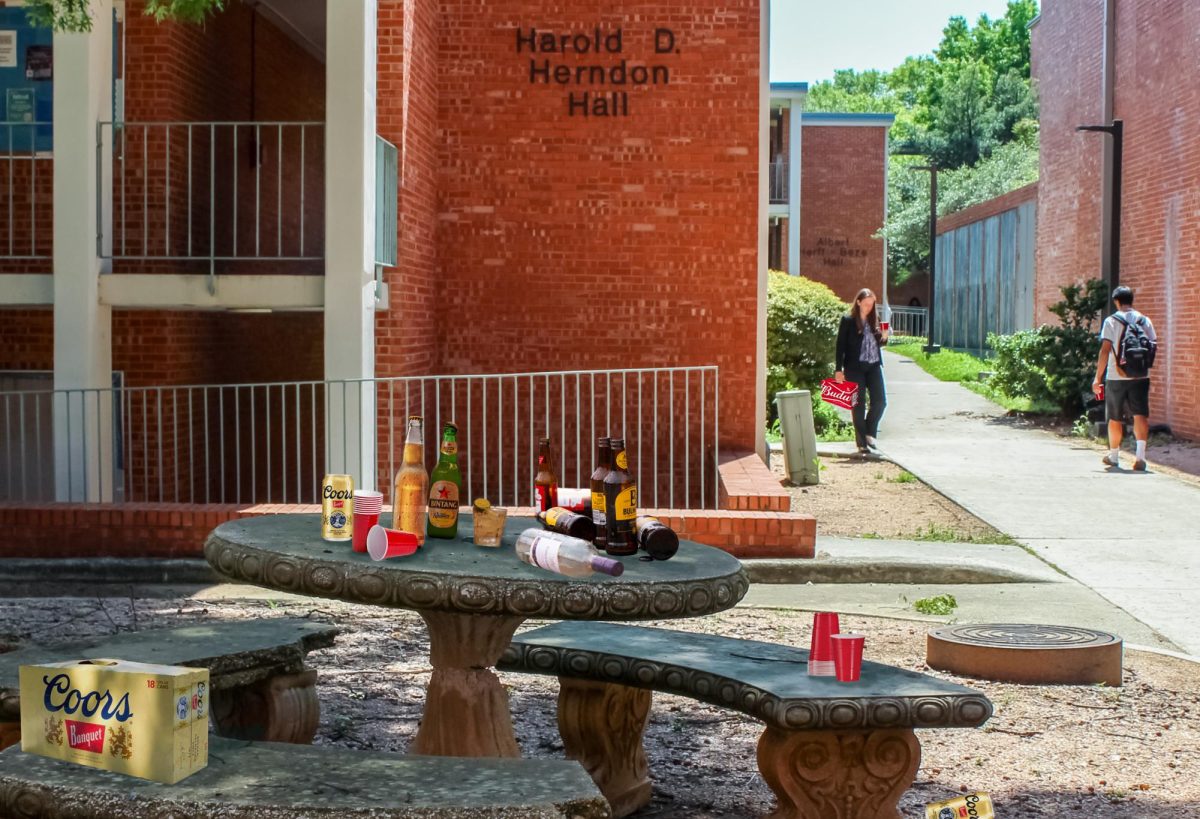Over the past few weeks, Trinity’s Residential Life announced in emails that housing prices and the City Vista selection process are changing. From 13 different pricing options to four, Residential Life has consolidated its pricing for all campus housing.
The previous pricing tables offered “single,” “special single,” “double” and “special double” rooms for residential halls and “one person,” “two people,” “three people” and “four people” options for City Vista apartments, all with per-semester pricing. Now, there are only two types respectively: traditional private and traditional shared, and apartment-style private and apartment-style shared, still paid for per semester.
“Special” rooms offered amenities such as private bedrooms, a shared living room or larger floor plans, and regular single and double rooms were dorms with one or two people in the room sharing a bathroom in a suite. The new pricing guide has removed the extra cost to these rooms, basing the prices simply on whether one person has a bedroom to themself (private) or are sharing with someone (shared).
Residential Life now offers two prices for residential halls, from first-year to upperclassmen dorms: $4,670 for traditional shared rooms across all residence halls and $5,100 for a traditional private upper division room, such as rooms in North Hall or South Hall.
Though this simplification offers a price increase ($149) for those currently living in a double room, the price has decreased for those currently in single, special single and special double dorms. Under the new traditional private table, single dorms are $1,485 less, special single dorms are $1,849 less and special double dorms are $92 less.
For City Vista, there are two pricing options as opposed to the previous nine. Without taking the size of the apartment or the number of people in the apartment into account, Residential Life now charges $5,600 for all apartment-style shared apartments and $6,200 for all apartment-style private apartments, no matter if they have one, two or three bedrooms.
This raises the price of the apartments that are currently categorized into small two-people one-bedroom units, small four-people two-bedroom units and large four-people two-bedroom units by $438, $547 and $382.50, respectively. However, the prices for the rest of the apartments have lowered by an average of $1,396.
Rachel Boaz Toppel, director of residential life, submitted the proposal for pricing changes with the support of Andrew Wells, vice president of student affairs. The finance and administration departments were the groups to set the dollar amounts. The reason for the price updates, Boaz Toppel said, was simplification.
“If students remember, before this announcement, we had 13 or 14 different prices. It was confusing. It was confusing for everybody including us,” Boaz Toppel said. “Without digging, without thinking about it too hard, a student can think ‘Am I in a bedroom by myself? Is anyone else sleeping in the room with me? No? I’m in a private room, and this is the cost. Am I sharing my bedroom with someone? Is someone else sleeping in the bedroom? Yes? Great, it’s a shared room, and this is the cost.’ It also leads to more equity, so with the structure that we have now, it was really a flattening of those 14 different rates … It really does become luck of the draw and when your selection time is, and that is the same for every student.”
Some students expressed frustration with the pricing changes for the flattening of the rates, such as Lydia Jacobson, who said some students may find it “unfair.” However, Seven Aguirre, junior computer science major, agreed with Boaz Toppel that it was more equitable.
“I really like the new system of having it organized into just two different blocks instead of having each residence hall have its own price point,” Aguirre said. “I think it’s much more equitable to make upper division dorms cost the same instead of having it be varied, which made it feel like some people who had more money could live in a place like Lightner and some people who had less had to live in another place like one of the sister halls.”
Beyond the pricing changes, Residential Life no longer allows students living in City Vista to stay in their apartments over winter break without notifying Residential Life. Though students still have the opportunity to fill out the winter break housing application to stay in their City Vista apartment over winter breaks, Boaz Toppel said the reasoning behind this comes down to safety.
“Students are really great at keeping eyes on each other, in a positive way,” Boaz Toppel said. “We have a really caring community. So fewer students, fewer staff, it just didn’t feel like a good idea to have students in there when we had no way of tracking it and knowing exactly who was in our building, so that was really the motivation: it is one of our residence halls, so we’re going to treat it like one of our residence halls.”
The City Vista housing selection process for seniors is also changing. Unlike previous years when City Vista selection opened for seniors a day before juniors, seniors now have a City Vista reservation day on March 4 inwhich a limited number of rooms will be available for reservations. Seniors will RSVP for the event, giving permission for a roommate to represent them if they are unable to attend. At the event itself, the student will go through the selection process. If a student is not able to attend the event, one of their roommates or Residential Life will select their rooms for them.
Some rising seniors, however, are worried about their inability to attend the event. Landry Knight, junior international studies and Chinese studies double-major, and Lydia Jacobson, junior Spanish and education double-major, are rooming together next year and expressed that they are hoping that Residential Life understands their absence at the event.
“I know we got an email about it this past weekend basically saying we needed to attend a special reservation event, and I have a class that runs through the entirety of it, and my roommate … also has prior commitments, so we’re trying to coordinate,” Knight said. “I think it’s weird that they only have a one-time thing that you either have to be there or someone has to be there to represent you or you’re leaving it up to Res Life.”
As for the effects on rising juniors, Liam Shepperd, sophomore biology major, said that he is aiming to live in City Vista due to the price changes for both housing and meal plans. However, with seniors receiving priority, he stated that he wished there were changes in other aspects of Residential Life.
“I don’t mind seniors getting priority. That makes sense to me, but they should lift the three-year requirement because that’s just dumb,” Shepperd said. “If you’re going to give seniors priority to the cheapest thing on campus and force everyone to live in the more expensive option, you should give people the opportunity to opt out of that at least for two years.”
*This article was updated on 4/7 to add that pricing for housing is paid for on a per-semester basis.










